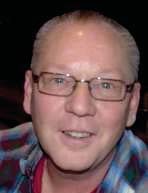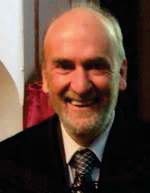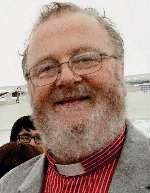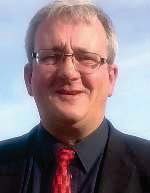The Big Question
This month’s question is: ‘The Bible tells us about Jesus’s teaching. Are there any teachers who have influenced your life?’

The Rev Malcolm Lyon, minister, Musselburgh: St Michael’s Inveresk
“As I sat down to think through this question, to my utter surprise, there are quite a few teachers who fit the bill and I had never really realised or appreciated how much of an influence my schooldays are playing on my journey through life.
“My wife and I both went to the same schools, King’s Meadow and Knox Academy, in Haddington and over the years as we have recalled friends of the past and old classmates, teachers inevitably get a mention. Some teachers taught both of us although not in the same class.
“ In my first charge there were three teachers in the parish. One of them was part of congregational trips to Rome and Malta that my wife and I organised.
“The other two were a married couple and I had the privilege, if somewhat mixed emotion, of conducting the husband’s funeral service.
“In my next charge one of our members mentioned her friend, who was another of our old teachers, who was celebrating his 90th birthday and my wife and I were invited to meet him and it turned out to be a superb day of ‘all our yesterdays’.
“Not long into the conversation he quite matter of fact said: ‘Malcolm, when my time comes I want you…’ sadly, the time came and so too did another great privilege.
I think the influence therefore has not been so much one person in any single definitive moment but more a collection of people in my lifetime’s experience.”

The Rev David Macartney, minister, North Coast Parish Church, Caithness
“Teaching is such a dii cult thing to do well! Anyone can open their mouth and speak, but to truly be successful teachers need to be called to their profession.
“The most influential teachers in my life have had such an obvious passion and enthusiasm for their subject that their excitement was contagious. They always had a sense of humour that could break tension and an ability to show what I was learning would actually be useful.
“When someone had those qualities then whether or not I was interested when I walked in, the sheer enthusiasm they showed meant that I couldn’t help but get caught up and carried along with them as they shared something that was truly important to them.
“As I got older I found that the teachers I respected most were those who could explain things to me in a way which I could visualise. Parables and stories are powerful teaching tools.
“If my imagination was i red then I would spend countless hours reading, watching and listening in order to further my own understanding.
“I have realised over time that the truly amazing teachers recognise the worth inherent in all the people they teach.
As Christ frequently demonstrated teaching his disciples, love, respect and a great deal of patience are more important than having an aptitude for learning.
“If someone believed that I was worth taking the time to instruct, then I believed it was worth taking the time to listen and to learn from them.”

The Rev Norman Hutcheson, Chaplain to the International Presbytery
“I was blessed in my youth with teachers at New College.
“Of more recent times I am indebted to Walter Brueggemann whose insights I first heard at Montreat Conference Center in North Carolina. Among his 100 books, he had published a volume on the Psalms which focussed on his neo Freudian analysis of orientation, disorientation and new orientation.
“While already familiar with the Psalter, it was challenging to delve into the Psalms with new meaning and purpose, Brueggemann argued that the problem with a hymnody that focuses on equilibrium, coherence, and symmetry is that it may deceive and cover over the life events we are no longer comfortable with. Life is savagely marked by disequilibrium, incoherence, and unrelieved asymmetry. He believed that the Psalms were about orientation, disorientation and new orientation. His contention was that a world where people feel disorientated does not need a church which feels all is well with the world. This sense of well being by the church had, in Brueggemann’s opinion, more to do with cultural osmosis than with the gospel itself
“How did that change me? Hope! Venom against imperial/cultural policy does not bring sudden change. Psalm 137, argued Brueggemann, is about the long haul, for those not able to see the change, but knowing that hope for change can be sustained for the long term. Hope is resilient here. I suggest that the communal function of this psalm is to act out and transmit to the next generation the yearning and the hate that can belong to every dislocated human being.”

The Rev Owain Jones, minister, United Church of Bute, Rothesay
“Let me tell you about Miss Williams, who was my teacher in P4 and P5. Miss Williams taught us not to be afraid to think, to probe and to push. She showed us slides of her holiday trekking in Lapland, and taught us times-tables and all about contact lenses.
“If you could get three other people interested in a subject you loved, you could form a ‘club’ to explore that on Wednesday afternoons. The girl who had the ‘Health Club’ was fascinated by the heart; another pupil’s dad was a butcher, so he brought in a sheep’s heart, and Miss Williams dissected it for us.
“There was a Geography Club, a Nature Club; my love of astronomy, cultivated in her class, set the scale of the universe for me, and I learned that there is no scale that you can sensibly apply to God.
She zoomed in on one dreamy little boy who had been written of two teachers ago, and let his phenomenal artistic gift blossom.
“She showed us what was in him, hinting at what might be in us. He had the ‘Art Club’, and actually began to mentor his friends.
“And she taught us how to hear and read the stories of Scripture like adults – something far too few adults are ever taught; did I mention that she was a minister’s daughter? “She taught us that truth is to be pursued, and never feared. Where truth is, God is. Miss Williams was really something.”

David Mcfie, Reader, Presbytery of Buchan
“I must confess, I have always dreaded education. Oh yes, I can talk and talk, but when it actually comes down to learning I could often be seen avoiding it.
‘Everything is possible through Christ’ could be seen as an answer to all questions, but sometimes it takes a while longer for that to be accomplished when we find obstacles en route and find that we are actually being guided as we live as Christians.
“So, what is the easy answer to the question? God inspires me through Jesus Christ. There can be a lot of people in your life whom you meet and who guide you along. At a point in my life in 2014 I was faced with the daunting possibility of further education and going to university as part of my training for becoming a Reader.
“Living with dyslexia has always instilled me with fear when it comes to education. However, modern technology enabled me to study as an online distance student at Aberdeen University, King’s College.
“There were challenges aplenty, but with guidance from within my home congregation and the Presbytery of Argyll, my fears were lifted, and I was inspired to go forward.
“The lectures and lecturers were interesting, but it was my tutor, Dr Newington who inspired me to continue my studies. That inspiration has brought me back as a full-time on-campus student. People inspire us to believe in ourselves as our life is guided by God through Jesus Christ.”